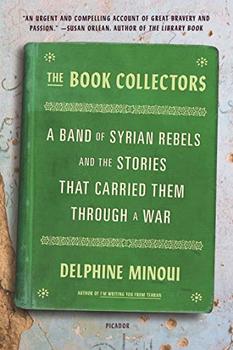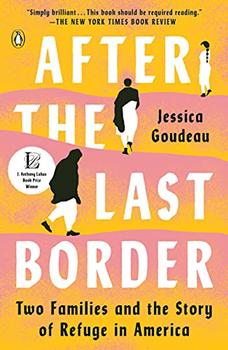Summary | Excerpt | Reviews | Beyond the book | Read-Alikes | Genres & Themes | Author Bio

A Band of Syrian Rebels and the Stories That Carried Them Through a War
by Delphine MinouiAbout halfway through The Book Collectors, I was disappointed. I came into the book with a preconceived notion that this was going to be a life-and-death story about a library. A Schindler's List, of sorts, about saving books in war-torn Syria. Yet, I felt it was missing the mark.
It was not the quality of writing or storytelling that was letting me down. Delphine Minoui is an amazing writer, and the book benefits from a fantastic, stilt-free translation from the French by Lara Vergnaud. The author intersperses her interviews with the protagonists — who were stockpiling a library of books from bombed-out houses in, Daraya, a suburb of Damascus — with a local history of the conflict and tales of avoiding barrel bombs (explosive and shrapnel laden barrels rolled out of helicopters by the Syrian military in attacks against civilians).
Minoui is careful not to dramatize the war itself, which though admirable and lending credibility to the stories she shares, does not make for the most exciting retelling of librarian warriors. The most dramatic moments in the book often depict the author waiting to see if her friends in Syria are still alive to reply to her messages.
I put the book down for a while, flummoxed about not liking it as much as I felt I should. I was hopeful that perhaps it would grab hold of me when I came back several days later.
It did. Upon returning to it, I had a better sense of the storytelling mode I was stepping into. It dawned on me that I had been approaching this book through a tainted lens. The Book Collectors is not a real-life drama about a library under siege; it's a character study about men finding refuge from Armageddon, as well as hope for the future, through books.
This is not a book about saving books or a clandestine library. Books are the proverbial campfire around which these men meet and share their trials and tribulations with the author, a self-professed bibliophile living in France. The library is simply a conduit through which the survivors' stories flow. ("Men" is used explicitly here, as aside from the author and her daughter, there are only a handful of passages briefly mentioning women.) One of the men, Omar, explains:
War is destructive. It transforms men, kills emotions and fears. When you're at war, you see the world differently. Reading is a diversion, it keeps us alive. Reading reminds us that we are human.
The story being told is straightforward. Minoui, a lover of books and a writer about Shiite society in the Middle East, learns about people creating a secret library while under siege through a post on Facebook. The library is built deep underground, and the protagonists collect books from ruined homes, writing the names of the original owners in each book. They then check the books out to local residents.
Delphine attempts to meet the librarians remotely via the internet. She eventually gets in contact and builds a relationship with Ahmad – the main protagonist and a founder of the library. From there, a virtual friendship is built over their shared love of books. Communication, typically done using SMS and the WhatsApp messaging service, is tenuous during the siege, as Daraya is often cut off from the internet.
From there, they build a friendship around their shared love of books. Ahmad informs Minoui about what's happening in the suburb, how people are surviving and the state of the library, and loves to talk about books. He also begins to introduce the author to dozens of other patrons and helpers of the library. The most prominent of these additional characters are an amateur, though passionate, videographer, and the resident academic who uses the library to teach and inspire on myriad topics.
The book is largely a collection of people's feelings during the siege. Minoui shows great compassion for the horrible position they are in. She succeeds in humanizing these young men not as freedom fighters or terrorists, but everyday victims of circumstances beyond their control. They are neither pro-government or pro-extremist. They are survivors and books are their raison d'être.
The Book Collectors works because of its structure. The writing is poetic, but the chapters are short. In fact, most start and conclude with an abruptness resembling the variable length of WhatsApp video chats. In lesser hands, the book would feel like a series of disjointed journal entries recapping what was said in patchy internet interviews. But Minoui uses the choppy style to mimic the intermittent nature of how she met and came to know the individuals in the book. She then teases out deeper and hidden meanings from many of the seemingly banal conversations.
Though a serious book about a serious topic, there are a handful of absurd interludes too. For example, The 7 Habits of Highly Successful People is one the most popular books in the library. The image of people reading this self-help book while being bombed and scrounging for food is like something out of a Monty Python skit. Yet, occasionally Minoui's tight weaving of stories over the years comes off as contrived. Though I'm sure the gist of the vignette is true, when the photographer protagonist is saved by shrapnel hitting his camera, the writing feels trite, if not downright sentimental, which is a shame.
The book putters to a close that might disappoint if it were not real people's lives being written about. Fortunately for the protagonists, a cliché "French ending" this is not, but neither is it happy. Simulating the traumatic survivor experiences of the characters themselves, there is no neatly tied conclusion, just a slow fade out.
The main takeaway after following this group's lives through the siege is that books offer people solace during dark times. Subject matter is irrelevant. It is the books themselves that offer people hope, a second chance. Even when all seems lost, standing on the shoulders of books, we might rise again.
![]() This review was originally published in The BookBrowse Review in November 2020, and has been updated for the
November 2021 edition.
Click here to go to this issue.
This review was originally published in The BookBrowse Review in November 2020, and has been updated for the
November 2021 edition.
Click here to go to this issue.

If you liked The Book Collectors, try these:

by Evan Friss
Published 2024
An affectionate and engaging history of the American bookstore and its central place in American cultural life, from department stores to indies, from highbrow dealers trading in first editions to sidewalk vendors, and from chains to special-interest community destinations

by Jessica Goudeau
Published 2021
The story of two refugee families and their hope and resilience as they fight to survive and belong in America.




Censorship, like charity, should begin at home: but unlike charity, it should end there.
Click Here to find out who said this, as well as discovering other famous literary quotes!
Your guide toexceptional books
BookBrowse seeks out and recommends the best in contemporary fiction and nonfiction—books that not only engage and entertain but also deepen our understanding of ourselves and the world around us.